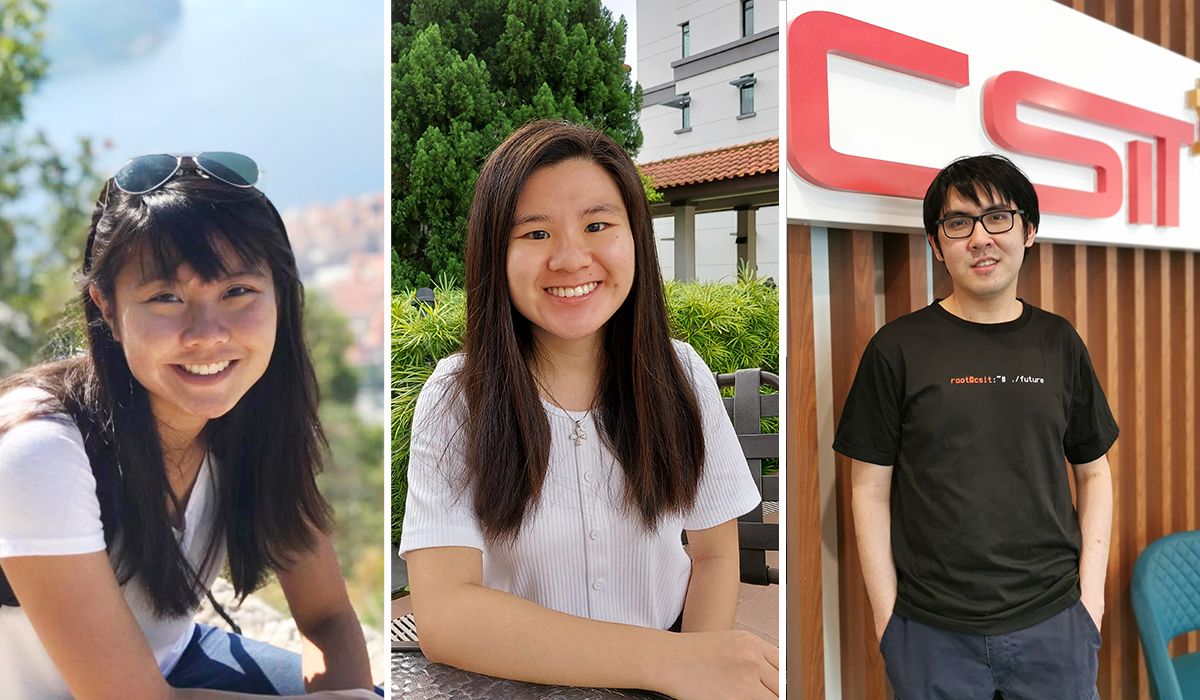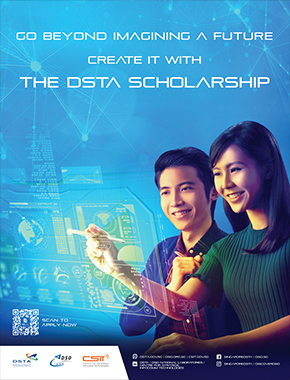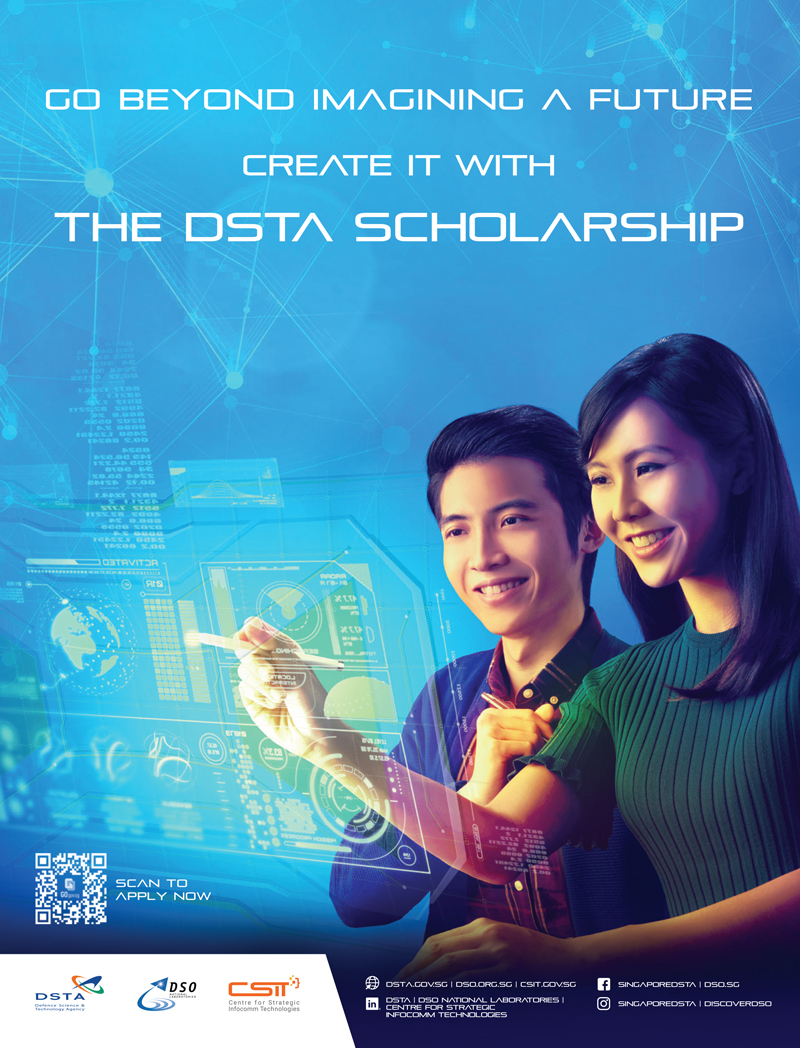Left: Carolyn Ng is a Senior Engineer in DSTA working on next-gen tech for the Singapore Army. She is a DSTA Scholar, and she holds a Bachelor of Electrical Engineering with Honours from NUS, and a Master of Control System from Imperial College London, United Kingdom.
Middle: Chelsea Chia is a Cybersecurity Researcher at the Cybersecurity Lab at DSO. She is a DSTA Scholar and she holds a Bachelor of Computing (Computer Science) with Honours from NUS. She is also on the University Scholars Programme.
Right: Mark Lee is with CSIT's Operations Cloud Infrastructure and Services. He is a DSTA Scholar and he holds a Master of Engineering in Computing (AI) from Imperial College London, United Kingdom.
Warfare has changed tremendously in recent years with the advent of advanced technologies, and it is no longer fought with just bombs and bullets. Battles are also waged in cyberspace, where hackers look for vulnerabilities in a country's infocomm infrastructure to cripple its network and economy.
In Singapore, the Ministry of Defence takes a serious view in advancing the nation's security capabilities. With that, agencies such as the Defence Science and Technology Agency (DSTA), DSO National Laboratories (DSO), and the Centre for Strategic Infocomm Technologies (CSIT) were established. Collectively, they form the Defence Technology Community (DTC), which offers the DSTA Scholarship to attract and nurture talent with the passion and desire to contribute Singapore's evolving national security needs.
Carolyn Ng, Chelsea Chia and Mark Lee are DSTA Scholars currently contributing their expertise at DSTA, DSO and CSIT respectively.
We caught up with them, who shared with us their scholarship and career journeys so far. They also gave us a glimpse of what it is like to be working in some of Singapore's most important defence organisations.
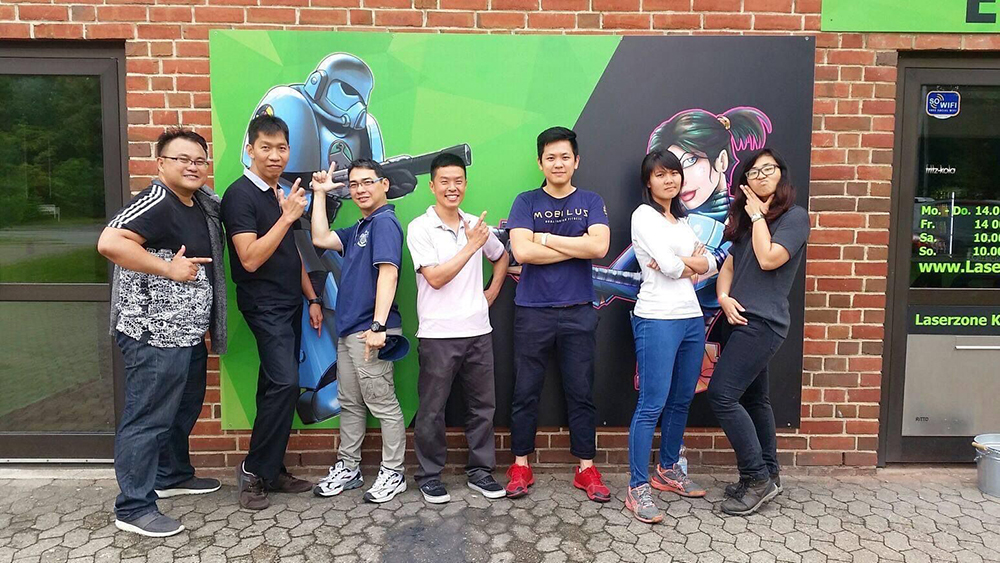
Carolyn Ng - Caroyln (second from right) appreciates DSTA's work culture, which facilitates teamwork and personal development.
Firstly, how did all of you discover the DSTA Scholarship, and what made you apply for it?
Carolyn: With my clear interest in engineering, I wanted a scholarship that would enable me to pursue a prestigious engineering degree with plenty of learning opportunities and support along the way. I also met DSTA engineers at a scholarship fair who shared how they have contributed towards Singapore's development, shaping exciting defence engineering and technology initiatives. It made me wonder about the possibilities that I could contribute towards making Singapore a better and safer place to live in.
Chelsea: My internship mentor recommended that I take up the DSTA Scholarship since I enjoyed my time at DSO, the largest defence R&D organisation in Singapore. As I had prior experience in research and was keen on going into R&D, DSO was an ideal choice. I enjoyed the highly technical and exploratory nature of work during my internship at DSO, and I was attracted by the talented DSO community and their drive to push for excellence.
Mark: I have always been interested to take up a Computer Science (CS) degree in university because it would best enable me to pursue a career in deep technology. This attracted me to apply for the DSTA Scholarship, as it was supportive of its scholars studying CS.
Carolyn, we read that you had the chance to embark on the Global Internship Programme while studying. Tell us about your experience.
Carolyn: DSTA's exclusive Global Internship Programme took me to ThyssenKrupp Marine Systems (tkMS) in Kiel, Germany! While I was there, DSTA was working with tkMS on the Republic of Singapore Navy's (RSN) newest submarines. I got to explore cool new digital IT concepts, such as the virtualisation of onboard submarine IT systems, which could increase their efficiency and reduce the equipment size, weight and power requirements.
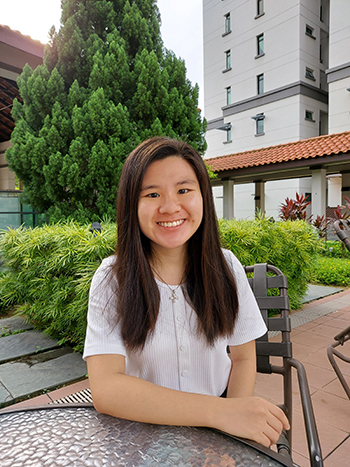
Chelsea Chia
Chelsea and Mark, how did your organisations support you in your studies?
Chelsea: To allow us to know more about defence technology, arrangements to events such as the Singapore Airshow and Singapore Defence Technology Summit were organised. I also had the chance to intern at DSO for a second time while I was in my second year of university. It equipped me with more in-depth knowledge about security techniques and tools, and further insights on the role of a cybersecurity researcher.
Mark: Both DSTA and CSIT were flexible in adjusting my mandatory internship and enabled me to perform another internship at the Ministry of Education's Experimental Systems Technology Laboratory during my summer break from Imperial College. This gave me an insight into software engineering from a different dimension and further honed my skills.
These experiences must have helped you transit more seamlessly to your actual work upon graduation. Tell us more about your current roles and responsibilities.
Carolyn: I am a Senior Engineer in DSTA's Land Systems Programme Centre, and I am currently working on the next generation of Command and Control (C2) systems for the Singapore Army. This includes the delivery of an on-premise Army cloud infrastructure, which facilitates more collaborative and consolidated operations when developing digital capabilities and solutions. It was rolled out to support health enforcement efforts at the International Maritime Security Conference and to coordinate security operations during National Day Parade this year. I work with industry partners and lead the ground deployment, while applying my technical knowledge and influencing the system design to bring the first private cloud capabilities for the SAF.
Chelsea: As a cybersecurity researcher, I explore and develop techniques that help to strengthen Singapore's resilience to cyber-attacks. With the rapid advancement of many critical systems to digitally based ones, it is important for us to stay ahead of potential threats such as hackers that could compromise the security and running of systems. We also work closely with various organisations to exchange ideas and improve Singapore's cybersecurity capabilities.
Mark: My work involves designing, building, maintaining, and extending core infrastructure that runs CSIT's mission critical products. My team also works with CSIT's product teams to ensure an excellent software development experience. We achieve these by building reliable and scalable internal products through a combination of open-source, commercial and in-house tools. Additionally, we leverage on automation to enhance efficiency and develop software to optimise existing systems.
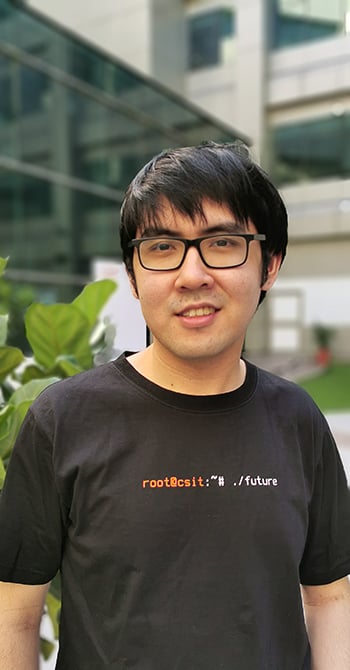
Mark Lee
How is the work culture at DSTA, DSO and CSIT?
Carolyn: DSTA's multidisciplinary projects help cultivate a strong team environment, where we seek novel ways to innovate with tech! It is also heartening to see higher management implementing new initiatives for better staff mental health and providing strong employee support. For example, we are inspired to chart our personalised career development plans through mentorship sessions with our supervisors. There are also many opportunities to attend courses, workshops and conferences to improve our skillsets.
Chelsea: Similarly in DSO, there is a huge emphasis on employee learning. We are encouraged to go on courses and conferences to keep up to date with advances in our field. My lab conducts a weekly technical sharing session, where staff would take turns to share about their experiences with a project or useful tools discovered.
Mark: CSIT's work culture places a strong emphasis on learning, innovation and collaboration. Due to our passion for digital technology, robust discussions are very common. Officers from different domains are also given space to collaborate and come up with creative solutions to improve work processes in year-round hackathons. CSIT is a great workplace where we grow and develop together with some of the best digital engineers in Singapore.
What would you say to convince someone to apply for the DSTA Scholarship?
Carolyn: If you have an interest in engineering, science or technology, and are keen to contribute purposefully to our nation's defence and security, the DSTA Scholarship can help you chart a path and open doors as you explore your life decisions. You will certainly be well equipped with skills and resources to build a strong career foundation.
Chelsea: Apply for the DSTA Scholarship if you are looking for a career that is more than just a job. In the DTC, the work you do carries a greater purpose in contributing towards national security. The DSTA Scholarship will also allow you to work alongside like-minded, talented individuals who are passionate about science, engineering, research, and technology. I enjoy working together on projects and have learnt a great deal from them!
Mark: DTC's national security mission is extremely meaningful, especially with the increase in grey zone conflicts over the past decade. I find that the work I do needs to go beyond merely generating profits and serve a larger purpose. If you are also keen to do meaningful work, this is something that you can be assured of if you take up the DSTA scholarship and pursue a career in the DTC.

